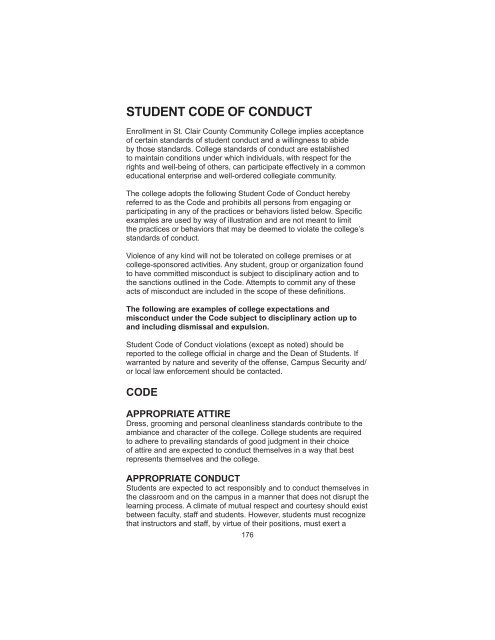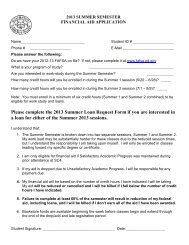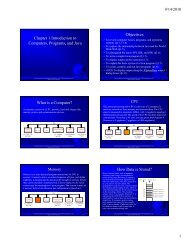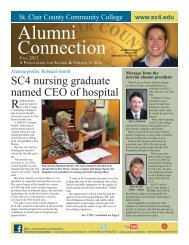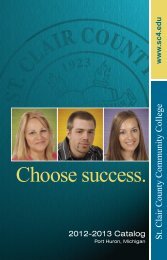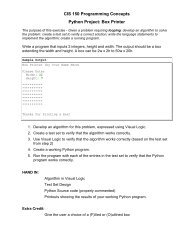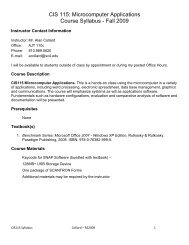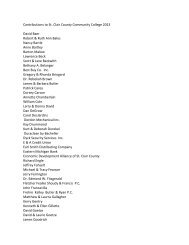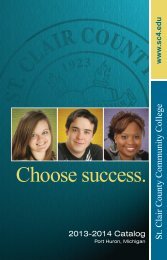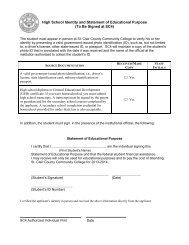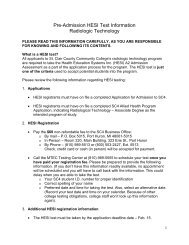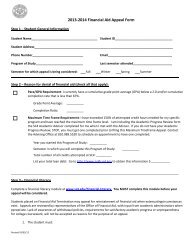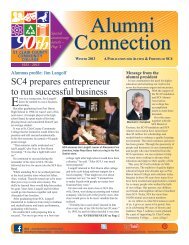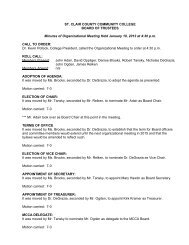student code of conduct - St. Clair County Community College
student code of conduct - St. Clair County Community College
student code of conduct - St. Clair County Community College
Create successful ePaper yourself
Turn your PDF publications into a flip-book with our unique Google optimized e-Paper software.
STUDENT CODE OF CONDUCT<br />
Enrollment in <strong>St</strong>. <strong>Clair</strong> <strong>County</strong> <strong>Community</strong> <strong>College</strong> implies acceptance<br />
<strong>of</strong> certain standards <strong>of</strong> <strong>student</strong> <strong>conduct</strong> and a willingness to abide<br />
by those standards. <strong>College</strong> standards <strong>of</strong> <strong>conduct</strong> are established<br />
to maintain conditions under which individuals, with respect for the<br />
rights and well-being <strong>of</strong> others, can participate effectively in a common<br />
educational enterprise and well-ordered collegiate community.<br />
The college adopts the following <strong>St</strong>udent Code <strong>of</strong> Conduct hereby<br />
referred to as the Code and prohibits all persons from engaging or<br />
participating in any <strong>of</strong> the practices or behaviors listed below. Specific<br />
examples are used by way <strong>of</strong> illustration and are not meant to limit<br />
the practices or behaviors that may be deemed to violate the college’s<br />
standards <strong>of</strong> <strong>conduct</strong>.<br />
Violence <strong>of</strong> any kind will not be tolerated on college premises or at<br />
college-sponsored activities. Any <strong>student</strong>, group or organization found<br />
to have committed mis<strong>conduct</strong> is subject to disciplinary action and to<br />
the sanctions outlined in the Code. Attempts to commit any <strong>of</strong> these<br />
acts <strong>of</strong> mis<strong>conduct</strong> are included in the scope <strong>of</strong> these definitions.<br />
The following are examples <strong>of</strong> college expectations and<br />
mis<strong>conduct</strong> under the Code subject to disciplinary action up to<br />
and including dismissal and expulsion.<br />
<strong>St</strong>udent Code <strong>of</strong> Conduct violations (except as noted) should be<br />
reported to the college <strong>of</strong>ficial in charge and the Dean <strong>of</strong> <strong>St</strong>udents. If<br />
warranted by nature and severity <strong>of</strong> the <strong>of</strong>fense, Campus Security and/<br />
or local law enforcement should be contacted.<br />
CODE<br />
APPROPRIATE ATTIRE<br />
Dress, grooming and personal cleanliness standards contribute to the<br />
ambiance and character <strong>of</strong> the college. <strong>College</strong> <strong>student</strong>s are required<br />
to adhere to prevailing standards <strong>of</strong> good judgment in their choice<br />
<strong>of</strong> attire and are expected to <strong>conduct</strong> themselves in a way that best<br />
represents themselves and the college.<br />
APPROPRIATE CONDUCT<br />
<strong>St</strong>udents are expected to act responsibly and to <strong>conduct</strong> themselves in<br />
the classroom and on the campus in a manner that does not disrupt the<br />
learning process. A climate <strong>of</strong> mutual respect and courtesy should exist<br />
between faculty, staff and <strong>student</strong>s. However, <strong>student</strong>s must recognize<br />
that instructors and staff, by virtue <strong>of</strong> their positions, must exert a<br />
176
measure <strong>of</strong> authority in the classroom and other campus areas.<br />
<strong>St</strong>udents should respect this authority. Disciplinary problems may<br />
result in a <strong>student</strong> being withdrawn from class and, in extreme cases,<br />
dismissed from the college.<br />
DISORDERLY CONDUCT<br />
Disorderly <strong>conduct</strong> is prohibited and is defined as acting in a manner<br />
to annoy, disturb, interfere with, obstruct or be <strong>of</strong>fensive to others,<br />
including but not limited to shouting or making excessive noise either<br />
inside or outside a building to the annoyance or disturbance <strong>of</strong> others;<br />
verbally abusing college <strong>of</strong>ficials (either on the phone, in person or via<br />
electronic communications) acting in performance <strong>of</strong> their duties; acting<br />
in a lewd or indecent manner; making threats; harassing others.<br />
ASSAULT AND THREATS<br />
Assault and threats are prohibited, and include, but are not limited<br />
to, the following: committing physical abuse and/or battery or other<br />
behavior resulting in harm to any person; placing a person in fear <strong>of</strong><br />
imminent physical danger or injury; making threats or engaging in<br />
behavior to harm self or others.<br />
CLASSROOM AND LABORATORY SAFETY<br />
VIOLATIONS<br />
<strong>St</strong>udents must abide by classroom safety regulations. Safety glasses,<br />
headgear, aprons, lab coats, earplugs and other appropriate safety<br />
equipment may be needed by all <strong>student</strong>s in specific courses.<br />
DISCRIMINATION AND HARASSMENT<br />
Discrimination and harassment are strictly forbidden on campus and in<br />
all college affiliated activities. Discrimination and harassment include<br />
inappropriate and <strong>of</strong>fensive <strong>conduct</strong> against any person, <strong>student</strong> or<br />
staff member on the basis <strong>of</strong> race, color, religion, gender, national<br />
origin, creed, ancestry, familial status, age, disability, marital status,<br />
height, weight, sexual orientation or other protected status. Modes <strong>of</strong><br />
contact or communication include, but are not limited to, in person, in<br />
writing, through telephone, electronic mail or instant messaging.<br />
Any form <strong>of</strong> harassment is unacceptable at <strong>St</strong>. <strong>Clair</strong> <strong>County</strong> <strong>Community</strong><br />
<strong>College</strong>, and complaints or charges will be followed through with<br />
appropriate action. SC4 employees and <strong>student</strong>s are individually<br />
responsible to ensure such harassment does not occur. Concerns<br />
should be directed to the Human Resources <strong>of</strong>fice, Room 203, Main<br />
Building.<br />
177
SEXUAL HARASSMENT<br />
Sexual harassment or related retaliation is strictly prohibited on<br />
campus and in college affiliated activities. Prohibited <strong>conduct</strong> includes,<br />
but is not limited to, unwelcome verbal or physical acts that are<br />
sexual in nature, unrelated to the content or context, and sufficiently<br />
severe and/or pervasive as to objectively either (a) have the effect<br />
<strong>of</strong> unreasonably interfering with an individual’s work or academic<br />
performance, or (b) create an intimidating, hostile or <strong>of</strong>fensive learning<br />
or working environment. Sexual harassment includes, but is not limited<br />
to, sexually based unwelcome verbal remarks or physical advances,<br />
request for sexual favors, inappropriate and unwelcome contact, and<br />
explicitly or implicitly stating that submission or rejection <strong>of</strong> sexual<br />
acts or advances will be a factor in one’s employment, participation or<br />
evaluation within the <strong>College</strong> and/or its activities.<br />
Any form <strong>of</strong> harassment is unacceptable at <strong>St</strong>. <strong>Clair</strong> <strong>County</strong> <strong>Community</strong><br />
<strong>College</strong>, and complaints or charges will be followed through with<br />
appropriate action. SC4 employees and <strong>student</strong>s are individually<br />
responsible to ensure such harassment does not occur. Concerns<br />
should be directed to the Human Resources Office, Room 203, Main<br />
Building.<br />
DISHONESTY – ACADEMIC<br />
The college considers academic honesty to be essential to all<br />
academic performance. Instances <strong>of</strong> academic dishonesty will be<br />
treated as serious <strong>of</strong>fenses <strong>of</strong> the <strong>St</strong>udent Code <strong>of</strong> Conduct. <strong>St</strong>udents<br />
involved in activities such as cheating and/or plagiarism will be subject<br />
to disciplinary action up to and including dismissal.<br />
• Definition <strong>of</strong> plagiarism: Plagiarism is the appropriation <strong>of</strong><br />
language, thoughts or ideas <strong>of</strong> another author and claiming that<br />
as one’s own. Plagiarism is work not produced by the <strong>student</strong>, or<br />
work that does not credit borrowings from the original source(s).<br />
• Definition <strong>of</strong> cheating: Cheating can be, but is not limited to,<br />
a <strong>student</strong> using electronic technology, notes or other written<br />
materials not permitted by the instructor; looking at other<br />
<strong>student</strong>s’ papers without the instructor’s permission; requesting<br />
answers from other <strong>student</strong>s; or working with other <strong>student</strong>s when<br />
independent work is required. Situations where cheating may<br />
occur are during tests, exams, quizzes or other similar methods<br />
<strong>of</strong> evaluation.<br />
When the instructor has sufficient evidence <strong>of</strong> cheating or plagiarism,<br />
the instructor may impose disciplinary actions such as assigning a<br />
failing grade to the <strong>student</strong>’s assignment, quiz, paper or test.<br />
178
If the plagiarism or cheating involves major course work such as<br />
plagiarizing a research paper or cheating on a final exam, the instructor<br />
may fail the <strong>student</strong> in the course.<br />
DISHONESTY – NON-ACADEMIC<br />
Non-academic dishonesty includes, but is not limited to:<br />
• Furnishing false information to the college or college personnel,<br />
including Campus Security.<br />
• Furnishing false information at disciplinary proceedings.<br />
• Forgery; unauthorized alteration or unauthorized use <strong>of</strong> any<br />
college documents, records or identification cards, including<br />
computer records; and misuse <strong>of</strong> computer facilities and<br />
electronic mailing systems.<br />
• Giving false or incomplete replies to questions, verbal or written,<br />
on applications, forms or other documents required by properly<br />
authorized representatives <strong>of</strong> the college.<br />
DRUG AND ALCOHOL VIOLATION<br />
Intoxication; drug−altered states; and the possession, use or sale <strong>of</strong><br />
alcohol, illegal drugs or related paraphernalia; are strictly forbidden on<br />
campus or at or as part <strong>of</strong> any college affiliated activity. This prohibition<br />
includes, but is not limited to: possession <strong>of</strong> paraphernalia containing<br />
drug residue; and manufacture or distribution <strong>of</strong> illegal drugs or<br />
controlled substances. If <strong>student</strong>s are experiencing problems with<br />
drugs and/or alcohol, they should contact Advising, Room 120,<br />
Acheson Technology Center, or call (810) 989-5520.<br />
FIRE/FALSE ALARM/REPORT<br />
Knowingly or negligently causing or attempting to cause a fire in a<br />
college building; and initiating or causing to be initiated any false alarm/<br />
report, warning, or threat <strong>of</strong> fire, explosion or other emergency is<br />
prohibited.<br />
GAMBLING<br />
It is the policy <strong>of</strong> the college to prohibit gambling on the college<br />
campus. Except as hereinafter provided, the college prohibits the sale,<br />
solicitation or promotion <strong>of</strong> a game <strong>of</strong> chance, including, but not limited<br />
to lotteries, raffles, bingo or similar other activities on college premises<br />
or which use the college’s name in any way. The Board authorizes the<br />
President <strong>of</strong> the college to waive this prohibition for such fundraising<br />
activities which support <strong>student</strong> services or scholarships and which<br />
comply with any applicable laws and license requirements. The<br />
President may establish procedures and guidelines for applying for this<br />
waiver.<br />
179
GIVING FALSE INFORMATION<br />
No person shall give false or incomplete replies to questions, verbal or<br />
written, on applications, forms or other documents required by properly<br />
authorized representatives <strong>of</strong> the college.<br />
HAZING<br />
Any act <strong>of</strong> hazing is prohibited. Hazing is defined as any action taken<br />
or situation created intentionally, with or without consent, whether on or<br />
<strong>of</strong>f campus, to produce mental or physical discomfort, embarrassment,<br />
harassment or ridicule.<br />
INTERFERING WITH EVENTS<br />
Interfering with any normal college or college−sponsored events is<br />
prohibited and includes, but is not limited to, disruption <strong>of</strong> studying,<br />
teaching, research, administration, and fire, police or emergency<br />
services.<br />
LEWD BEHAVIOR<br />
Behavior that is lewd or indecent is prohibited. Such behavior is<br />
defined in consideration <strong>of</strong> the general standards <strong>of</strong> acceptable<br />
behavior and includes, but is not limited to, the following: obscene<br />
remarks, gestures or other communications; exposing oneself in an<br />
indecent manner; entering restrooms against the gender designation;<br />
viewing pornographic images; or engaging in sexual activities on the<br />
campus.<br />
MISUSE, THEFT OF FIRE SAFETY OR<br />
EMERGENCY EQUIPMENT<br />
Misuse, tampering, theft or damage to fire safety equipment such<br />
as fire extinguishers, exit signs, first aid kits, automated external<br />
defibrillators (AEDs) or other emergency supplies on campus is<br />
prohibited.<br />
NON-COMPLIANCE<br />
Failure to comply with reasonable directions <strong>of</strong> college <strong>of</strong>ficials,<br />
including college security <strong>of</strong>ficers, faculty and staff acting in<br />
performance <strong>of</strong> their duties is prohibited. Directives to cooperate in<br />
the administration <strong>of</strong> the Code including those to appear and give<br />
testimony at a college disciplinary proceeding, as well as directives to<br />
produce identification are included in the scope <strong>of</strong> this provision.<br />
REGULATION VIOLATION<br />
Any violation <strong>of</strong> other published regulations including, but not limited to,<br />
SC4 policies as listed in this catalog is considered a Code violation.<br />
180
SANCTION VIOLATION<br />
Violating the terms <strong>of</strong> any disciplinary sanction imposed in accordance<br />
with the Code is a Code violation.<br />
SEXUAL ASSAULT<br />
Inflicting any sexual invasion/assault upon any person without that<br />
person’s consent is prohibited. “Consent” requires actual words or<br />
<strong>conduct</strong> indicating a freely-given agreement to have sexual intercourse,<br />
or to participate in sexual activities. The college community should<br />
be aware that, depending on the particular circumstances, previous<br />
sexual relationships or current relationship between the persons<br />
involved, or silence, or lack <strong>of</strong> protest do not necessarily constitute<br />
consent. Further, the degree <strong>of</strong> impairment <strong>of</strong> a person’s ability to<br />
give or withhold consent (including, but not limited to, incapacity or<br />
helplessness caused by alcohol or any other drugs) may be introduced<br />
as pertinent information at any college disciplinary hearing.<br />
SMOKING ON CAMPUS<br />
Smoking is prohibited in all campus buildings, vehicles and outside<br />
areas <strong>of</strong> the campus where non-smokers cannot avoid exposure to<br />
smoke.<br />
Specifically, smoking is prohibited up to 20 feet outside any enclosed<br />
area to ensure that secondhand smoke does not enter the area<br />
through entrances, windows, ventilation systems or any other means.<br />
SOLICITATION<br />
In order to provide an environment that is conducive to teaching and<br />
learning, it has been determined by SC4 to prohibit outside persons<br />
from operating or distributing materials or items on the college campus.<br />
Any problems should be reported to Campus Patrol. Specifically:<br />
1. Selling, soliciting and advertising are prohibited unless an<br />
exception has been authorized by the Office <strong>of</strong> the Vice<br />
President for Administrative Services.<br />
2. Distribution <strong>of</strong> handbills on vehicles on college property is<br />
prohibited.<br />
TECHNOLOGY<br />
Computers and Internet Services – Acceptable Use Policy<br />
2013<br />
<strong>St</strong>. <strong>Clair</strong> <strong>County</strong> <strong>Community</strong> <strong>College</strong> provides computer, Internet<br />
and email services to support research and education to fulfill the<br />
mission <strong>of</strong> the college. These unique resources enrich the learning and<br />
instructional process and foster opportunities for collaborative work<br />
among college <strong>student</strong>s and staff.<br />
181
Privileges: Access to the college’s computer services, including the<br />
Internet, is a privilege granted to <strong>student</strong>s, faculty, staff and the public.<br />
Individual users, including public patrons, are to act responsibly,<br />
respect the rights <strong>of</strong> other users, and respect the integrity <strong>of</strong> the<br />
systems and related physical resources. The college reserves the<br />
right to limit, restrict or extend computing privileges and access<br />
to its information resources.Users and providers inherit privileges<br />
and obligations defined by several authorities:<br />
• Law (such as international copyright law, the U.S. Constitution,<br />
federal communications regulations, federal educational<br />
regulations and Michigan laws)<br />
• <strong>College</strong> policies (such as policies on plagiarism and harassment)<br />
• Service-provider requirements (typically specifying addresses,<br />
protocols, quotas and other technical standards)<br />
• Contracts (including licenses, warranties, service level<br />
agreements, memoranda <strong>of</strong> understanding and agreements with<br />
telecommunications services)<br />
Inappropriate use will result in denial or cancellation <strong>of</strong> that privilege.<br />
<strong>St</strong>. <strong>Clair</strong> <strong>County</strong> <strong>Community</strong> <strong>College</strong> reserves the right to monitor<br />
Internet use and determine if specific uses are consistent with the<br />
acceptable use practices. The college further reserves the right to deny<br />
access to prevent unauthorized or unacceptable activity, and could<br />
involve disciplinary action.<br />
Uses: Faculty, staff and <strong>student</strong>s may use the college’s computing<br />
resources only for purposes related to their studies, their<br />
responsibilities for providing instruction, the discharge <strong>of</strong> their duties as<br />
employees, their <strong>of</strong>ficial business with the college, and other<br />
college-sanctioned or authorized activities. Public users are expected<br />
to use the computers for research and educational pursuits.<br />
Restrictions: Use <strong>of</strong> the Internet for viewing, sending or retrieving<br />
any <strong>of</strong> the following are prohibited:<br />
• Pornographic material or inappropriate text files in violation <strong>of</strong><br />
Michigan criminal laws, including, but not limited to, Michigan<br />
obscenity laws MCLA 752.361-752.374 and other Michigan<br />
statutes and cases concerning obscenity<br />
• Libel or slander<br />
• Deliberately wasting or overloading computing resources, such<br />
as printing too many copies <strong>of</strong> a document<br />
• Fraud or misrepresentation<br />
• Commercial or for-pr<strong>of</strong>it purposes<br />
• Games or gambling<br />
• Personal and private enterprise<br />
182
• Personal advertisement or political lobbying<br />
• The modification or misrepresentation <strong>of</strong> files, data and/or<br />
passwords belonging to others<br />
• Use <strong>of</strong> the college’s trademarks, logos, insignia or copyrights<br />
without prior approval<br />
• Development or use <strong>of</strong> unapproved mailing lists<br />
• Academic dishonesty, including plagiarism<br />
• Violation <strong>of</strong> s<strong>of</strong>tware license agreements<br />
• Actions that would destroy, modify or abuse hardware and<br />
s<strong>of</strong>tware<br />
• Infiltration <strong>of</strong> a computer or computing system for any reason<br />
• Forged electronic mail to make it appear as though it originated<br />
from a different person<br />
• Electronic mail that is abusive, threatening, or for sexual, ethnic,<br />
religious, minority or other forms <strong>of</strong> harassment<br />
• Material that is posted or sent that is contrary to the mission or<br />
values <strong>of</strong> the college<br />
• Electronic mail that menaces or harasses an individual or<br />
individuals<br />
Such actions include, but are not limited to:<br />
• Sending or forwarding chain letters or email that uses a pyramid<br />
scheme to distribute communications to an exponentially<br />
growing collection <strong>of</strong> recipients<br />
• Deliberately flooding a user’s mailbox with automatically<br />
generated mail<br />
• Sending mail that is deliberately designed to interfere with proper<br />
mail delivery or access<br />
• Other acts forbidden by federal or state law<br />
• Attempting, successfully or not, to gain access to another<br />
person’s email files<br />
• Intentional distribution <strong>of</strong> computer viruses<br />
• Anything contrary to the college’s board policy<br />
All users are to abide by the 1976 United <strong>St</strong>ates Copyright Law and the<br />
Digital Millennium Copyright Act when using the Internet. Users must<br />
respect the legal protection applied to programs, data, photographs,<br />
music, written documents and other material as provided by copyright,<br />
trademark, patent, licensure and other proprietary rights mechanisms.<br />
Peer-to-peer (P2P) file sharing applications allow network users to<br />
download and share audio, video and picture files with each other for<br />
legitimate academic endeavors. Use <strong>of</strong> P2P file sharing applications for<br />
the unauthorized acquisition or distribution <strong>of</strong> copyrighted or licensed<br />
material by SC4 network users is prohibited on any SC4 college<br />
computer or the college’s network and may subject a <strong>student</strong> to civil<br />
and criminal liabilities.<br />
183
Copyright infringement is the act <strong>of</strong> exercising, without permission<br />
or legal authority, one or more <strong>of</strong> the exclusive rights granted to the<br />
copyright owner under section 106 <strong>of</strong> the Copyright Act (Title 17 <strong>of</strong> the<br />
United <strong>St</strong>ates Code). These rights include the right to reproduce or<br />
distribute a copyrighted work. In the file-sharing context, downloading<br />
or uploading substantial parts <strong>of</strong> a copyrighted work without authority<br />
constitutes an infringement.<br />
Penalties for copyright infringement include civil and criminal penalties.<br />
In general, anyone found liable for civil copyright infringement may be<br />
ordered to pay either actual damages or “statutory” damages affixed<br />
at not less than $750 and not more than $30,000 per work infringed.<br />
For “willful” infringement, a court may award up to $150,000 per work<br />
infringed. A court can, in its discretion, also assess costs and attorneys’<br />
fees. For details, see Title 17, United <strong>St</strong>ates Code, Sections 504, 505.<br />
Willful copyright infringement also can result in criminal penalties,<br />
including imprisonment <strong>of</strong> up to five years and fines <strong>of</strong> up to $250,000<br />
per <strong>of</strong>fense.<br />
There are a number <strong>of</strong> legal alternatives to illegal downloading<br />
or otherwise acquiring copyrighted material. For a listing <strong>of</strong> these<br />
alternatives, visit www.campusdownloading.com.<br />
The college recognizes that electronic communications and computer<br />
resources are no different than any other form <strong>of</strong> communication or<br />
resource available at the college. Users <strong>of</strong> this medium are bound by<br />
but not limited to:<br />
• Federal, state and local laws<br />
• Compliance with all college policies regarding sexual, racial and<br />
other forms <strong>of</strong> harassment<br />
• Contractual obligations<br />
• All policies <strong>of</strong> the Board <strong>of</strong> Trustees<br />
Alleged violations will be processed according to college policies and<br />
procedures.<br />
Misuse <strong>of</strong> computing, networking or information resources may result<br />
in the loss <strong>of</strong> computing and/or network access. Additionally, misuse<br />
can be prosecuted under applicable statutes. Users may be held<br />
accountable for their <strong>conduct</strong> under any applicable college policies,<br />
procedures or employee contracts. Illegal production <strong>of</strong> s<strong>of</strong>tware<br />
and other intellectual property protected by U.S. copyright law is<br />
subject to civil damages and criminal punishment including fines and<br />
imprisonment.<br />
The college disclaims liability due to losses due to technology failures,<br />
due to intruders (viruses, worms, hackers, etc.) or due to freaks <strong>of</strong><br />
nature.<br />
184
Users should use all available methods to protect their files, including<br />
the frequent changing <strong>of</strong> their passwords, encryption <strong>of</strong> data and use <strong>of</strong><br />
available campus network storage.<br />
The college makes every attempt to maximize security <strong>of</strong> its computer<br />
systems. In the event that data have been corrupted as a result <strong>of</strong><br />
intrusion, the college’s Office <strong>of</strong> Information Technology should be<br />
notified immediately. Every reasonable attempt will be made to restore<br />
files to their status prior to intrusion; HOWEVER, THE OFFICE OF<br />
INFORMATION TECHNOLOGY CANNOT GUARANTEE FULL<br />
RESTORATION.<br />
THEFT OR DAMAGE TO PROPERTY<br />
No person or persons shall steal or damage property belonging to<br />
another person, organization or institution. This includes tampering with<br />
coin operated machines. Violators may be handled by the local police,<br />
the college disciplinary process, or both.<br />
• Theft: Theft <strong>of</strong> property or <strong>of</strong> services, or knowing possession <strong>of</strong><br />
stolen property.<br />
• Destruction <strong>of</strong> Property: Destroying or damaging college<br />
property, such as library holdings or the property <strong>of</strong> others.<br />
UNAUTHORIZED ACCESS OR USE OF COLLEGE<br />
FACILITIES<br />
<strong>St</strong>udents and members <strong>of</strong> the public are not allowed in campus<br />
buildings or facilities after the building has been closed and locked to<br />
<strong>student</strong> and public access. Access to locked buildings requires <strong>of</strong>ficial<br />
permission from an authorized college representative and notification<br />
<strong>of</strong> Campus Patrol. <strong>St</strong>udents in secured buildings after closing must<br />
be under the supervision <strong>of</strong> an authorized college <strong>of</strong>ficial such as<br />
an <strong>of</strong>ficial club advisor, coach, faculty member or appropriate staff<br />
member.<br />
UNAUTHORIZED USE OF THE COLLEGE’S NAME<br />
Any unauthorized commercial use <strong>of</strong> the college’s name, logo or other<br />
representation, or undertaking any unauthorized action in the name <strong>of</strong><br />
the college are prohibited.<br />
VIOLATION OF LAW<br />
Violation <strong>of</strong> federal and/or local law, including, but not limited to,<br />
possession <strong>of</strong> any falsified identification or the manufacture, sale or<br />
distribution <strong>of</strong> local, state or federal identification.<br />
WEAPON/EXPLOSIVE VIOLATION<br />
The use, possession, storage or bringing into a building or class <strong>of</strong> any<br />
firearms, ammunition, knives, other weapons or objects that could be<br />
185
construed as weapons is strictly forbidden. Items that pose a potential<br />
hazard to the safety or health <strong>of</strong> others (such as explosives in any<br />
form) also are prohibited.<br />
SANCTIONS<br />
The college’s policy is directed toward imposing more severe<br />
disciplinary sanctions based on the nature <strong>of</strong> the case. The college<br />
seeks to preserve flexibility in the imposition <strong>of</strong> sanctions so that<br />
each <strong>student</strong> or group <strong>of</strong>fender is afforded the greatest possibility for<br />
appropriate and just treatment. Significant mitigating or aggravating<br />
factors shall be considered, which may include the current demeanor<br />
and the presence or lack <strong>of</strong> a disciplinary or criminal record <strong>of</strong> the<br />
<strong>of</strong>fender, as well as the nature <strong>of</strong> the <strong>of</strong>fense and the extent <strong>of</strong> any<br />
damage, injury or harm resulting from it.<br />
Sanctions may include:<br />
Verbal Warning − Reported verbal reprimand.<br />
Censure − An <strong>of</strong>ficial written reprimand for violation <strong>of</strong> specified<br />
regulations, including a warning that continuation or repetition <strong>of</strong><br />
prohibited <strong>conduct</strong> will be cause for disciplinary action.<br />
Disciplinary Probation −The college may limit and/or monitor <strong>student</strong><br />
participation in academic, privileged or extracurricular activities for a<br />
specified period <strong>of</strong> time. Violation <strong>of</strong> the terms <strong>of</strong> disciplinary probation<br />
may result in suspension or expulsion from the college.<br />
Suspension − Exclusion from classes and other privileges or activities,<br />
including access to college premises or college−sponsored activities <strong>of</strong>f<br />
campus, as set forth in the notice <strong>of</strong> suspension, for a specified period<br />
<strong>of</strong> time. Any <strong>student</strong> who is suspended shall not be entitled to any<br />
tuition or fee refund and is barred from college premises in accordance<br />
with the suspension.<br />
Expulsion − Termination <strong>of</strong> <strong>student</strong> status and exclusion from college<br />
privileges and activities, including access to college premises or<br />
college − sponsored activities <strong>of</strong>f campus, in perpetuity. Any <strong>student</strong><br />
who is expelled shall not be entitled to any tuition or fee refund and is<br />
barred from college premises.<br />
Restitution − Repayment to the college or to an affected party for<br />
damages, loss or injury resulting from a violation <strong>of</strong> the Code.<br />
Other Sanctions − Other sanctions may be imposed instead <strong>of</strong> or<br />
in addition to those specified above. For example, <strong>student</strong>s may be<br />
186
subject to restrictions upon or denials for college parking privileges for<br />
violations involving the use or registration <strong>of</strong> motor vehicles on campus.<br />
Service projects also may be assigned. <strong>St</strong>udents may be directed to<br />
have no contact with other <strong>student</strong>s and/or may be forbidden to access<br />
specified areas <strong>of</strong> campus.<br />
DUE PROCESS<br />
The Due Process system defines the procedure to be applied to<br />
instances in which a <strong>student</strong> charged with noncompliance with<br />
college rules and regulations (<strong>St</strong>udent Code <strong>of</strong> Conduct) objects to<br />
the discipline decision rendered by a college <strong>of</strong>ficial. The complete<br />
procedure is available from the Dean <strong>of</strong> <strong>St</strong>udents, Room 208, Main<br />
Building and online.<br />
187


